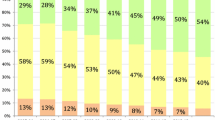Abstract
In 2004, Prime Minister Lee called teachers to “teach less” so that students might “learn more”. In 2005, the Ministry of Education clarified this philosophical statement to mean transforming learning from quantity to quality—“more quality and less quantity” in education. This is in line with the national vision of ‘Thinking Schools, Learning Nation’. This policy initiative, which began in 2004, is set to change the fundamental nature of education in Singapore. This article discusses this initiative, its major implications for schools in Singapore and the challenges to be addressed in the implementation of the policy. In particular, the article discusses the issues of understanding an engaged learning paradigm, establishing signposts for the shift from quantity to quality and the difficulties of system-wide transformation. The challenge for schools is to go beyond the form of the initiative to bring real, substantial and sustainable educational change through this movement.
Similar content being viewed by others
References
Bangert-Drowns R.L., Pyke C. (2001). A taxonomy of student engagement with education software: An exploration of literate thinking with electronic text. Journal of Educational Computing Research 24(3): 213–234
Costa A.L. (2004). Foreword. In: Ho B.T., Netto-Shek J.-A., Chang S.C.A. (eds) Managing project work in schools: Issues and innovative practices. Singapore, Prentice Hall, pp. xiii–xix
Costa, A. L., & Kallick, B. (2000). Discovering and exploring habits of mind. Alexandria: Association for Supervision & Curriculum Development.
Dempster F.N. (1993). Exposing our students to less should help them learn. Phi Delta Kappan 74(6): 432–437
Fullan M. (2000). Leading in a culture of change. San Francisco, Jossey Bass
Gergen K.J. (1985). The social constructionist movement in modern psychology. American Psychologist 40: 266–275
Goh, C. T. (1997). Shaping our future: Thinking schools, learning nation. Singapore Government Press Release. Speech by Prime Minister Goh Chok Tong at the Opening of the 7th International Conference on Thinking, 2 June.
Grant S.G. (1996). Local authority over content and pedagogy: Cross-current influences on teachers’ thinking and practice. Theories and Research in Social Education 24: 237–272
Ho B.T., Netto-Shek J.-A., Chang S.C.A. (eds) (2004). Managing project work in schools: Issues and innovative practices. Singapore, Prentice Hall
Jones B., Valdez G., Nowakowski J., Rasmussen C. (1994). Designing learning and technology for educational reform. Oak Brook, North Central Regional Educational Laboratory
Kearsley G., Shneiderman B. (1998). Engagement theory: A framework for technology-based teaching and learning. Educational Technology 38(5): 20–23
Lee, H. L. (2004). Our future of opportunity and promise. Singapore Government Press Release. Address by Prime Minister Lee Hsien Loong at the 2004 National Day Rally at the University Cultural Centre, National University of Singapore, 22 August.
Lee, H. L. (2006). Address by Prime Minister Lee Hsien Loong at the 2006 Teachers’ Day Rally at the Singapore Expo, 31 August.
Lui, T. Y. (2007). Speech by RADM (NS) Lui Tuck Yew, Minister of State for Education, at the Opening Ceremony of the “Redesigning Pedagogy: Culture, Knowledge and Understanding” Conference at the Nanyang Auditorium, 28 May.
Ministry of Education. (2005a). Project work. Retrieved July 14, 2007 from http://www.moe.gov.sg/projectwork/
Ministry of Education. (2005b). Glossary. Retrieved July 14, 2007 from http://www.moe.gov.sg/corporate/contactonline/2005/Issue22/glossary/p_glossary.htm
Ministry of Education. (2005c). Greater support for teachers and school leaders. Singapore Government Press Release, 22 September.
Ministry of Education. (2005d). Flexible school design concepts to support teaching and learning. Singapore Government Press Release, 29 December.
Ng P.T. (2003a). The Singapore school and the School Excellence Model. Educational Research for Policy and Practice 2(1): 27–39
Ng P.T. (2003b). The Singapore learning society. In: Kumar P. (ed) Organisational learning for All seasons: Building internal capabilities for competitive advantage. Singapore, National Community Leadership Institute, pp. 7–22
Ng P.T. (2005a). Students’ perception of change in the Singapore education system. Educational Research for Policy and Practice 3(1): 77–92
Ng P.T. (2005b). Innovation and Enterprise in Singapore schools. Educational Research for Policy and Practice 3(3): 183–198
Tan J. (2003). Reflections on Singapore’s Education Policies in an Age of Globalisation. In: Mok K.H., Welch A. (eds) Globalisation and educational restructuring in the Asia Pacific Region. Houndmills, Palgrave Macmillian, pp. 32–57
Tharman, S. (2004a). To light a fire: Enabling teachers, nurturing students. Speech by Mr Tharman Shanmugaratnam, Minister for Education, at the MOE Work Plan Seminar 2004 at the Ngee Ann Polytechnic Convention Centre, Singapore, 29 September.
Tharman, S. (2004b). Speech by Mr Tharman Shanmugaratnam, Minister for Education, at the Academy of Principals’ Global Education Conference, Singapore, 8 November.
Tharman, S. (2005a). Parliamentary reply by Mr Tharman Shanmugaratnam, Minister for Education, at the Singapore Parliament, 9 March.
Tharman, S. (2005b). Achieving quality: Bottom up initiative, top down support. Speech by Mr Tharman Shanmugaratnam, Minister for Education, at the MOE Work Plan Seminar 2005 at the Ngee Ann Polytechnic Convention Centre, Singapore, 22 September.
Tharman, S. (2005c). Speech by Mr Tharman Shanmugaratnam, Minister for Education, at the opening of the conference on ‘Redesigning Pedagogy: Research, Policy and Practice’ at the National Institute of Education, Singapore, 30 May.
Vygotsky L. (1978). Mind in society: The development of higher psychological process. Cambridge, Harvard University Press
Wee H.T. (1998). The desired outcomes of education. Singapore, Ministry of Education
Zhao Y. (2005). Increasing math and science achievement: The best and worst of the East and West. Phi Delta Kappan 87(3): 219–222
Author information
Authors and Affiliations
Corresponding author
Rights and permissions
About this article
Cite this article
Ng, P.T. Educational reform in Singapore: from quantity to quality. Educ Res Policy Prac 7, 5–15 (2008). https://doi.org/10.1007/s10671-007-9042-x
Received:
Revised:
Accepted:
Published:
Issue Date:
DOI: https://doi.org/10.1007/s10671-007-9042-x




